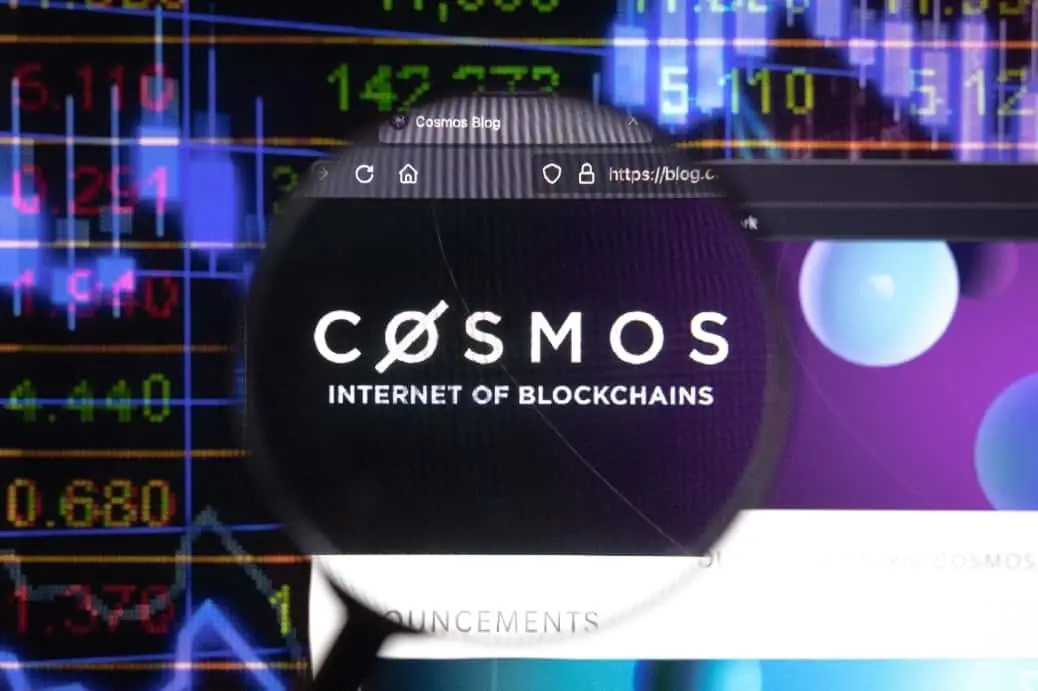Cosmos inflation adjustment dispute: slight advantage through proposal, founder "angrily forks"
Author: Jiang Haibo, PANews
The price of ATOM has long been criticized by supporters of the Cosmos ecosystem. A series of high-valued projects have emerged based on the Cosmos SDK, such as the former Terra and the current Celestia and dYdX. However, the valuation of Cosmos Hub (ATOM) is lower than that of these ecosystem projects.
In an effort to boost the valuation of ATOM, a proposal to adjust the inflation rate of ATOM was recently put forward at the Cosmos forum, aiming to reduce the maximum inflation rate from 20% to 10%. This also means that the current annualized staking yield will be adjusted from about 19% to approximately 13.4%. Subjectively, we might think that such a proposal, which is beneficial for raising the price of ATOM, would pass without controversy. However, the reality is that the proposal sparked unexpected intense debate and ultimately passed by a very narrow margin, significantly revealing the differences among various interest groups.
After the proposal to adjust the inflation rate of ATOM was approved, Jae Kwon, co-founder of Cosmos and Tendermint, expressed dissatisfaction with the outcome on Twitter and proposed forking ATOM. He believes that the current governance mechanism may not adequately represent the opinions of all token holders.
The discord between Kwon and other team members has a long history. He resigned due to disagreements with other members on governance and project development direction, later splitting Ignite (the renamed Tendermint) into two independent entities: Ignite and NewTendermint, with Kwon serving as CEO of NewTendermint.
Kwon's proposal has sparked widespread discussion within the community, with many questioning the possibility of a fork and its impact on the Cosmos ecosystem. Forking ATOM could signify a significant change for the Cosmos network, with important implications for its long-term development and the interests of token holders. This also reflects the governance challenges within the Cosmos community.
Cosmos has paid an excessively high cost for maintaining network security
The high inflation of ATOM has long been criticized. According to data from Staking Rewards, prior to the proposal's approval, the inflation rate of 14.97% was among the highest for native tokens of major PoS public chains. It has a target staking rate, generally set at 67%, and the inflation rate is dynamically adjusted within the range of 7% to 20% based on the actual staking rate and the target staking rate. If the actual staking rate is below the target staking rate, the inflation rate will increase to encourage users to stake; if the staking rate exceeds the target staking rate, the inflation rate will decrease to alleviate inflationary pressure. Staking Rewards shows that the staking rate before the proposal's approval was 65.4%, indicating that even though the inflation rate was already high, it was still on the rise.
Research by Blockworks Research indicates that Cosmos may have paid an excessively high cost for maintaining network security, thus proposing a transition to a fixed inflation rate. The study found that at a maximum inflation rate of 10%, nearly all 180 validators could achieve break-even or profit solely from commission income, and validators could also choose to raise their commission rates to help cover operational costs.
Based on this research, Zaki Manian, co-founder of the decentralized asset management protocol Sommelier, proposed to lower ATOM's maximum inflation rate to 10%. The voting period for this proposal started on November 12 and ended on November 26.
94.97% of voting accounts supported, but the support rate by voting power was not high
The proposal ultimately concluded voting on November 26, passing by a narrow margin. Based on the number of ATOMs participating, the voting rate reached 72.6%, with 41.1% in favor, 31.9% against, 6.6% vetoed, and 20.4% abstained.

The conditions for the proposal's approval in Cosmos require: a voting rate of over 40%, more than 50% of the voting power (excluding abstentions) in favor, and the number of veto votes (excluding abstentions) within 33.4%. According to the final voting results, the support rate was 41.4%, with the proportion of votes in favor, against, and veto (excluding abstentions) being only 51.63%, slightly above the minimum requirement of 50%.

In contrast to the above voting results, the support ratio of the number of voters, although this condition does not affect the voting outcome for PoS public chains, can reflect the proportion of supporters to some extent. Among the 173,000 voting accounts, 164,000 chose to support, accounting for 94.97%. Some pointed out that many accounts voting with less than 0.1 ATOM participated and chose to support, making the proportion of supporting accounts appear very high; this part of the accounts may come from airdrop hunters. However, according to incomplete statistics, the number of supporting accounts in various holding ranges exceeded the number of opposing votes. For example, among the 143 validators who voted, the support rate was 54.55%, the opposition rate was 27.27%, and the veto rate was 0.7%.

The voting results were more influenced by validators. Of the total 73.16 million ATOM supporting votes, 70.43 million ATOM came from validators. Validators such as ZKV, GAME, and Sikka chose to support, while Allnodes, DokiaCapital, and Cosmostation chose to oppose. It is important to note that the votes from validators automatically include the ATOM delegated to them by other users. If users disagree with the validator's vote, they can choose to vote themselves to override the validator's voting result.
Views of Supporters and Opponents
The proposal to lower the inflation rate of ATOM has sparked heated and in-depth discussions within the Cosmos community. Supporters believe this will bring a series of long-term positive effects, while opponents express concerns and objections regarding the potential impact of the proposal. This divergence reflects the challenge of balancing different interests in decentralized governance within the Cosmos community.
Some community members supporting the proposal are optimistic about the reduction in inflation rate promoting the adoption of the Liquidity Staking Module (LSM), believing it will increase the liquidity of ATOM and attract more funds to DeFi applications on Cosmos, thus promoting the development of the Cosmos DeFi ecosystem. Supporters also point out that by reducing the inflation rate, the scarcity of ATOM may increase, potentially enhancing its market value. This strategy is considered beneficial for long-term investors. Based on the research from Blockworks Research, supporters believe that even with the maximum inflation rate reduced to 10%, validators can still maintain economic viability, providing economic support for the proposal.
However, community members opposing the proposal worry that lowering the inflation rate may reduce users' motivation to stake ATOM, thereby affecting network security. Some opponents are particularly concerned about the impact of lowering the inflation rate on small holders, believing it may lead to further concentration of ATOM holdings. Additionally, some opponents fear that this change may bring uncertainty to the market, especially in the short term. Regarding the positive impact of lowering the inflation rate on LSM adoption and the development of the DeFi ecosystem, some opponents express skepticism, stating that more evidence is needed to support this view.
However, from the voting results, it seems that small holders are more inclined to support the proposal to lower the inflation rate, which, if passed, could immediately create positive feedback for ATOM's price. In contrast, validators and certain large holders, driven by their own interests, seem to have more reason to oppose it in order to maintain a higher inflation rate. According to incomplete statistics, among voting accounts holding less than 5,000 ATOM, the number of supporting accounts is several times that of opposing accounts (including vetoes); among those holding over 5,000 ATOM, the number of supporting accounts is about twice that of opposing accounts. However, the lead in the final number of supporting votes is not significant.

Assuming the market capitalization of ATOM remains unchanged, under high inflation, the nominal reward rate (the yield provided to stakers by the network) and the actual reward rate (nominal reward rate - inflation rate) are both higher, resulting in greater income for large stakers and validators compared to those who merely hold ATOM.
Summary
The proposal to reduce inflation in Cosmos has sparked heated discussions and ultimately passed by a narrow margin. From the voting results, 94.97% of voting accounts supported the proposal, but based on voting power, the number of supporting votes was only 41.1%. Although many accounts among supporters holding a small number of tokens may come from airdrop hunters, the number of supporters across various holding ranges exceeds that of opponents, indicating broader support for the proposal.
The final voting result was mainly influenced by validators. Of the total 73.16 million ATOM supporting votes, 70.43 million ATOM supporting votes came from validators. This also gives us a hint that when delegating staking, in addition to considering yield rates, validator commission rates, and other factors, one should also consider whether the interests of the validator align with their own. If they do not align, users can choose to vote themselves to override the validator's voting result.











